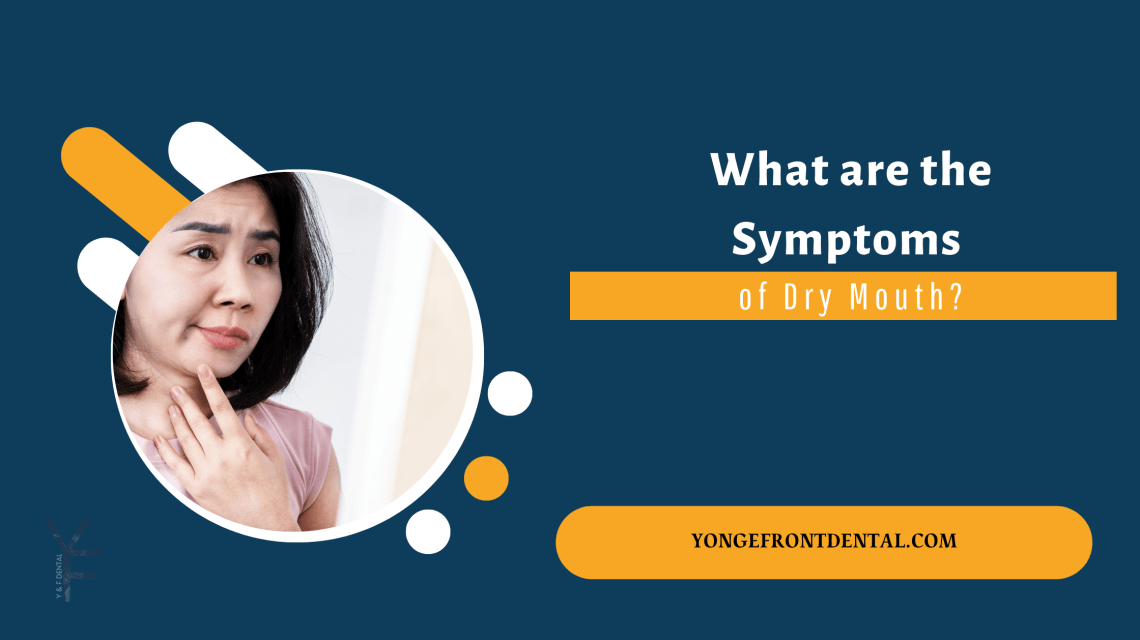Dry mouth, medically referred to as xerostomia, may seem like a minor inconvenience at first-something a glass of water might fix. But for many people, persistent dry mouth is more than just a temporary discomfort. It can be a sign of an underlying health issue and often contributes to serious dental problems if left untreated.
At Yonge and Front Dental, we regularly see patients across Toronto who are unaware that their daily discomfort may actually stem from chronic dry mouth. In this article, we’ll explore the most common Symptoms of Dry Mouth, the causes, and how to recognize when it’s time to seek professional dental care.
Dry Mouth: What Is It?
Dry mouth occurs when the salivary glands in your mouth don’t produce enough saliva to keep it moist. Saliva isn’t just there for comfort-it plays a critical role in maintaining oral health. It helps digest food, neutralize acids, protect enamel, and wash away food particles and bacteria.
Without enough saliva, your mouth becomes vulnerable to decay, gum disease, and infection. Dry mouth isn’t a disease itself but a symptom of other conditions or factors. The sooner it’s identified, the easier it is to manage and prevent complications.
Common Symptoms of Dry Mouth
Recognizing the signs early can help prevent long-term oral health issues. While some symptoms might be mild, others can affect your daily life in noticeable ways.
Here are the most frequently reported symptomsof dry mouth:
1. Constant Dryness or Sticky Sensation
A persistent feeling of dryness, stickiness, or roughness in the mouth is the most obvious sign. You might feel like your mouth is lined with cotton, especially upon waking up or after talking for long periods.
2. Difficulty Speaking or Swallowing
Saliva makes it easier to talk and swallow. People with dry mouth often find themselves pausing to sip water during conversations or meals, especially when eating dry or dense foods.
3. Cracked Lips and Mouth Sores
Dry skin on and around the lips is another telling sign. Cracks, especially at the corners of the mouth (angular cheilitis), are not only painful but also prone to infection.
4. Bad Breath
When saliva is limited, bacteria can flourish. This often leads to halitosisor chronic bad breath, no matter how often you brush or rinse.
5. Dry or Burning Tongue
Many people describe a burning or tingling sensation in their tongue. The surface may appear dry, red, or even shiny. Sometimes, taste buds become less sensitive.
6. Altered Taste
Food might start to taste dull or metallic. Dry mouth can interfere with your ability to enjoy meals, which affects your nutrition and appetite over time.
7. Sore Throat and Hoarseness
A dry throat can lead to hoarseness, making it uncomfortable to speak. Some people experience a scratchy or sore throat regularly, especially if they breathe through their mouth at night.
8. Increased Thirst
You may find yourself reaching for water constantly, but hydration alone doesn’t always solve the root problem.
9. Dental Issues
One of the most concerning outcomes of dry mouth is increased risk of cavities, plaque buildup, and gum disease. Without enough saliva to clean the mouth, oral bacteria thrive.

What Causes Dry Mouth?
Dry mouth can result from a variety of factors-some temporary, others chronic. Understanding the root cause is key to effective treatment.
Medications
Many prescription and over-the-counter drugs list dry mouth as a side effect. These include:
- Antidepressants and anti-anxiety medications
- Antihistamines and decongestants
- Blood pressure medications
- Diuretics
- Muscle relaxants
- Pain medications
Dehydration
Not drinking enough water throughout the day or losing fluids through fever, sweating, vomiting, or diarrhea can reduce saliva production.
Medical Conditions
Several health issues are known to contribute to dry mouth, such as:
- Diabetes
- Sjögren’s syndrome
- Alzheimer’s disease
- Stroke or nerve damage
- HIV/AIDS
Cancer Treatments
Radiation therapy targeting the head or neck and certain chemotherapy drugs can affect the salivary glands, leading to dryness.
Lifestyle Factors
- Smoking or chewing tobacco
- Excessive alcohol or caffeine consumption
- Mouth breathing, especially while sleeping
Why Ignoring Dry Mouth Can Be Risky
You might be tempted to dismiss dry mouth as just a minor irritation. But when left unaddressed, it can cause:
- Tooth decaydue to constant exposure to harmful bacteria
- Gum inflammation and bleedingfrom plaque buildup
- Mouth infectionslike oral thrush (a yeast infection)
- Difficulty wearing dentures, if you have them
- Disrupted sleep, especially if you wake frequently for water
What starts as a dry sensation can eventually compromise your entire oral environment.

How Yonge and Front Dental Helps Patients With Dry Mouth
At Yonge and Front Dental, we take a personalized approach to diagnosing and managing dry mouth. Our dental team will assess your medical history, current medications, and lifestyle to understand the underlying cause.
Our solutions may include:
- Custom recommendations to increase saliva flow
- Prescribed oral rinses or artificial saliva products
- Specialized fluoride treatments to protect enamel
- Adjustments to oral hygiene routines
- Scheduling regular cleanings to prevent plaque buildup
Our goal is to not just treat the symptoms but to help you maintain long-term oral comfort and health.
When Should You See a Dentist?
If you’re experiencing any of the symptoms listed above consistently-especially alongside signs of tooth decay or gum discomfort-it’s time to schedule an appointment. Dry mouth may not go away on its own, and identifying it early can prevent more extensive dental work later.
Living in Toronto and Dealing With Dry Mouth?
Dry air, especially during winter months in Toronto, can worsen dry mouth symptoms. Whether it’s environmental, medical, or related to your daily habits, we’re here to help you find relief.
At Yonge and Front Dental, we welcome new patients and are always ready to provide compassionate, clear answers to your dental concerns. A dry mouth doesn’t have to be something you “just live with.”

Final Thoughts
Dry mouth might begin as a small annoyance, but if ignored, it can seriously affect your dental health and day-to-day comfort. Whether it’s cracked lips, bad breath, or trouble speaking, the signs shouldn’t be brushed aside.
If you’re located in Toronto and believe dry mouth is affecting your quality of life, book a consultation at Yonge and Front Dental. We’ll help you understand the cause and offer solutions that fit your needs.
FAQ
What are the first signs of dry mouth?
The earliest signs include a persistent dry or sticky feeling in the mouth, bad breath, and trouble swallowing or speaking.
Can dry mouth be a sign of a serious condition?
Yes. Conditions like diabetes or autoimmune disorders such as Sjögren’s syndrome often include dry mouth as a symptom.
Will drinking more water fix dry mouth?
Staying hydrated helps, but if dry mouth is due to medication or a health condition, water alone may not be enough.
How can a dentist treat dry mouth?
Your dentist can recommend saliva substitutes, review your


